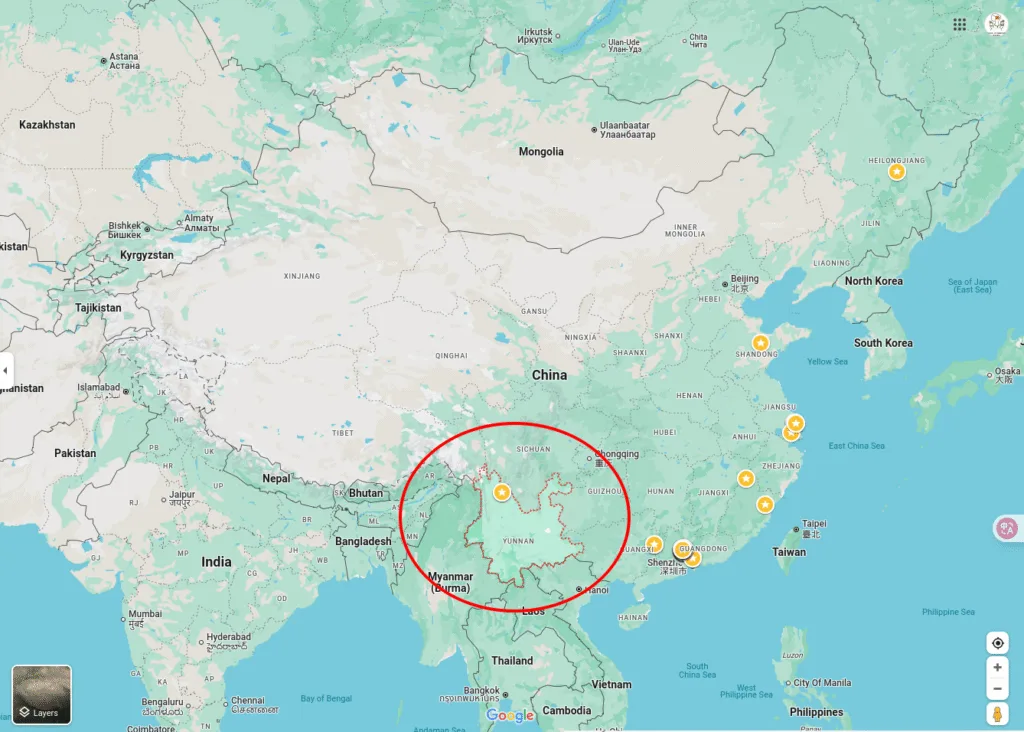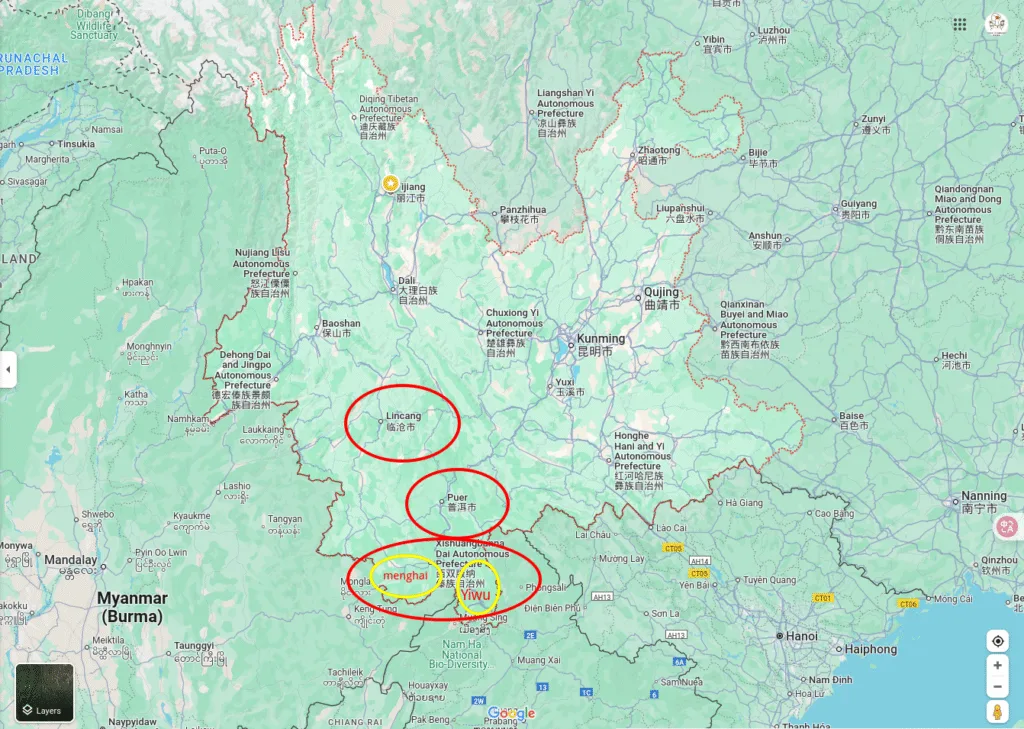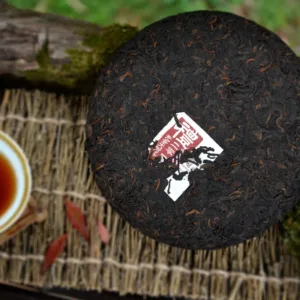Worldwide Free shipping for orders over $100 | Click Here To Subscribe to us for LATEST NEWS | Get 10% OFF "TEA10DIS"
Top 4 Puerh Tea Regions in Yunnan
Overview
Geographically, Yunnan Province, the homeland of puerh tea, is situated in southwestern China.

The flavor essence of puerh tea is deeply rooted in Yunnan’s unique geographical endowments. The current core producing areas are defined as four regions: Menghai, Yiwu, Lincang, and Pu’er City, which construct a complete flavor spectrum of puerh tea, ranging from wild intensity to smooth sweetness, with distinct climates, soils, and tea tree varieties.

Notably, the Baoshan area is no longer regarded as a core puerh region. Administratively, Menghai and Yiwu belong to Xishuangbanna, so the core regions could be categorized into three administrative zones (Xishuangbanna, Lincang, Pu’er City). However, the tea industry treats Menghai and Yiwu as independent regions due to their historical status and flavor uniqueness. If you are looking for Puerh Tea? Go to ripe puerh tea and raw puerh tea
1. Menghai: The Soul of Ripe Puerh Tea
As the core of Xishuangbanna Prefecture, Menghai (1,200–1,800m altitude) has an annual temperature difference of only ~10℃. Its unique clay-humus soil, rich in trace elements, provides an irreplaceable microbial environment for ripe tea fermentation.
Tea Characteristics
- Ripe Tea Benchmark: Famous for “Menghai Flavor,” teas like 7572 formula show deep red, translucent soup with aged and woody aromas, and tea polyphenols oxidation exceeds 60%.
- Wild Raw Tea: Villages like Laobanzhang yield raw tea with bold “tea qi,” strong bitterness turning to rapid sweetness. The 3.5% theanine creates a unique “bitter base, sweet soup” style.
2. Yiwu: The Pinnacle of Raw Tea Aesthetics
Located in the Six Ancient Tea Mountains, Yiwu (650–1,400m, 1,800mm annual rainfall) enjoys a microclimate ideal for tea. It preserves 12,000 mu of ancient gardens from the Ming-Qing dynasties, where tea trees coexist with virgin forests.
Tea Characteristics
- Fragrant & Silky: Typical Yiwu raw tea features “three aromas”—honey in dry leaves, floral in soup, and fruity at the cup bottom. 48% water extract content creates a soft, sweet broth.
- Aging Potential: With balanced tea polyphenols-amino acids (3:1), it develops complex camphor-medicinal aromas after 5+ years of aging.
3. Lincang: High-Value Refreshing Style
Yunnan’s largest tea producer (35% of provincial output), Lincang (1,400–2,200m), has a 15℃ diurnal temperature difference, nurturing Mengku large-leaf tea with unique “rock sugar sweetness.”
Tea Characteristics
- Rock Sugar Sweetness: Raw teas from Bingdao and Xigui have 4.2% amino acids, offering immediate sweetness (more prominent in cold brew), ideal for young tea lovers.
- Ripe Tea Innovation: Using “light fermentation,” teas like “Bingdao Ripe” show orange-red soup, blending raw tea’s freshness with ripe tea’s richness.
4. Pu’er City: Harmony of History & Balance
As the namesake of puerh tea, Pu’er City (2,000+ years of tea history) has 16,000 mu of ancient gardens in Jingmai Mountain (World Heritage tentative list). At 1,100–1,700m, it creates diverse flavors of “one mountain, one taste.”
Tea Characteristics
- Balanced Flavor: Raw tea combines Yiwu’s softness and Menghai’s strength; ripe tea integrates Lincang’s sweetness and Menghai’s richness. Tea polyphenols oxidation stays in the optimal 45–50% range.
- Cultural Aroma: Jingmai Mountain tea carries a unique orchid fragrance and wild charm, deeply tied to Bulang ethnic tea culture.
Flavor Matrix Comparison
Region | Representative Aromas | Taste Traits | Best Tasting Period | Collection Rating |
Menghai | Aged, Woody | Robust, Thick | Ripe: 3–5 years | ★★★★★ |
Yiwu | Honeyed, Floral | Silky, Sweet | Raw: 5–10 years | ★★★★☆ |
Lincang | Rock Sugar, Fruity | Refreshing, Sweet | Raw: 1–3 years | ★★★☆☆ |
Pu’er | Orchid, Wild | Balanced, Harmonious | Both: Long-term storage | ★★★★☆ |
Tasting Guide
- Beginners: Start with Lincang Bingdao ripe tea or Pu’er Jingmai raw tea for a friendly taste and value.
- Connoisseurs: Compare the “hardness-softness” contrast between Menghai Laobanzhang and Yiwu Mahei raw teas.
- Collectors: Focus on pure ancient tree teas from small regions like Yiwu Bohetang and Menghai Laobanzhang.
